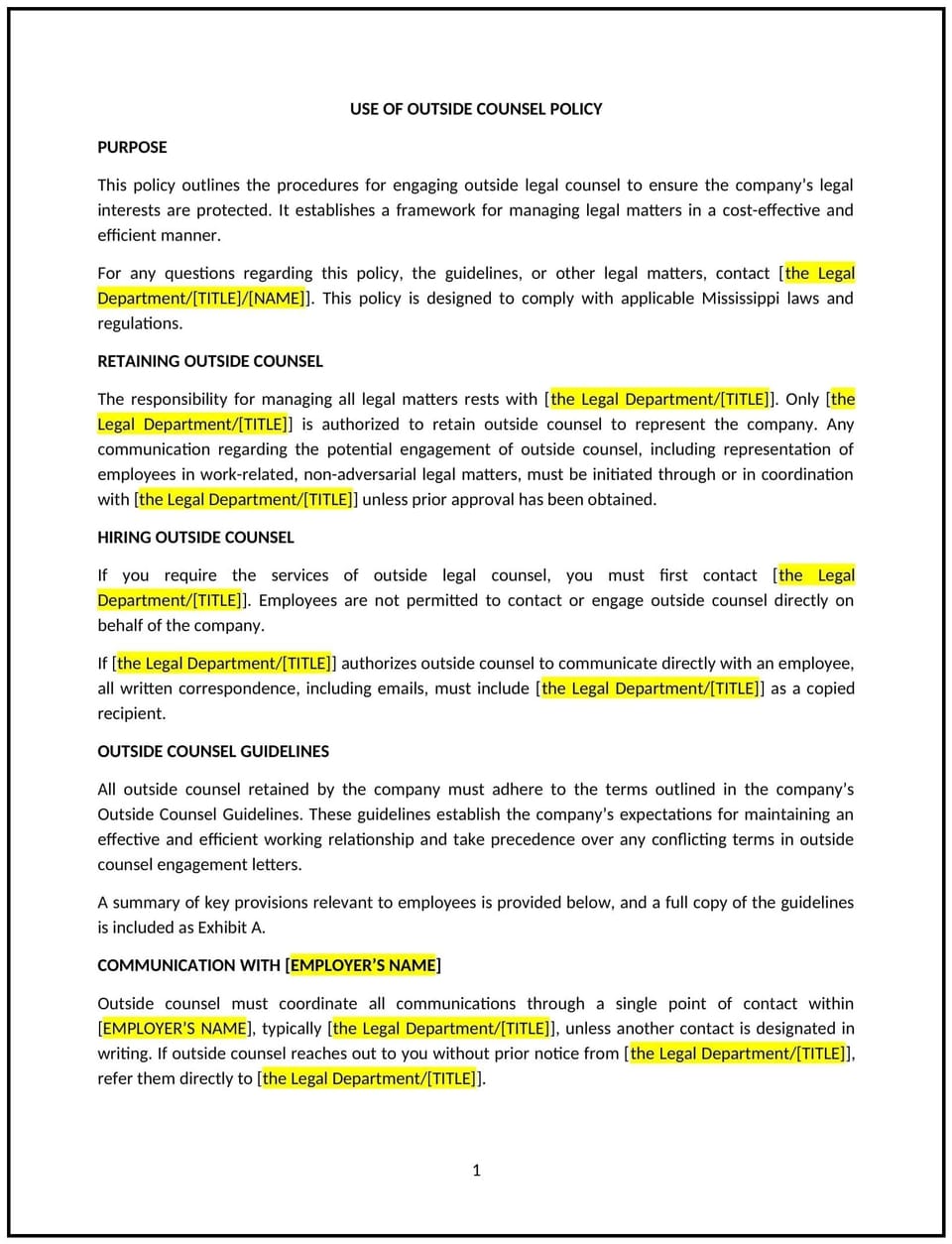Use of outside counsel policy (Mississippi): Free template

Use of outside counsel policy (Mississippi)
This use of outside counsel policy is designed to help Mississippi businesses manage the engagement of external legal counsel for specialized or complex legal matters. It outlines procedures for selecting, hiring, and managing outside counsel.
By adopting this policy, businesses can ensure cost-effective and efficient legal support, maintain compliance, and align with best practices for legal management.
How to use this use of outside counsel policy (Mississippi)
- Define when to use outside counsel: Clarify situations where external legal counsel is required, such as litigation or specialized expertise.
- Establish selection criteria: Outline factors for choosing outside counsel, such as experience, cost, and reputation.
- Set approval processes: Specify steps for approving the engagement of outside counsel, including budget approvals.
- Monitor performance: Regularly review the performance and costs of outside counsel to ensure value and quality.
- Train staff: Educate employees on when and how to engage outside counsel.
- Review and update: Assess the policy annually to ensure it aligns with evolving legal needs and business objectives.
Benefits of using this use of outside counsel policy (Mississippi)
This policy provides several advantages for Mississippi businesses:
- Ensures expertise: Provides access to specialized legal knowledge and skills when needed.
- Controls costs: Establishes clear guidelines for selecting and managing outside counsel, reducing unnecessary expenses.
- Enhances compliance: Aligns with best practices for legal management and risk mitigation.
- Reduces risks: Minimizes the potential for legal disputes or errors by engaging qualified counsel.
- Supports decision-making: Provides a structured approach to managing complex legal matters.
Tips for using this use of outside counsel policy (Mississippi)
- Communicate clearly: Share the policy with employees and include it in onboarding materials.
- Provide training: Educate staff on when and how to engage outside counsel.
- Monitor compliance: Regularly review engagements and costs to ensure adherence to the policy.
- Address issues promptly: Take corrective action if outside counsel underperforms or exceeds budget.
- Update regularly: Revise the policy as needed to reflect changes in legal needs or business objectives.
Q: How does this policy benefit businesses?
A: It helps businesses ensure cost-effective and efficient legal support, maintain compliance, and reduce risks.
Q: When should businesses engage outside counsel?
A: Outside counsel should be engaged for specialized or complex legal matters, such as litigation or regulatory compliance.
Q: How can businesses control costs when using outside counsel?
A: Businesses can set budgets, negotiate rates, and regularly review invoices to control costs.
Q: What should businesses do if outside counsel underperforms?
A: Businesses should address the issue through clear communication, performance reviews, and, if necessary, terminating the engagement.
Q: How often should this policy be reviewed?
A: The policy should be reviewed annually or whenever there are significant changes to legal needs or business objectives.
This article contains general legal information and does not contain legal advice. Cobrief is not a law firm or a substitute for an attorney or law firm. The law is complex and changes often. For legal advice, please ask a lawyer.


